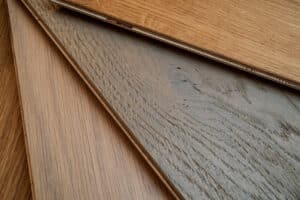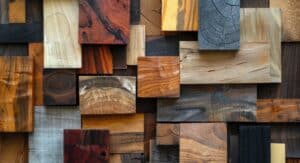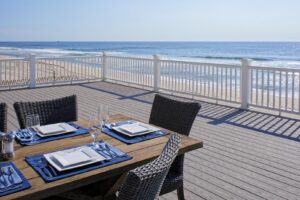When it comes to building or upgrading your outdoor deck, selecting the perfect railing material is a crucial decision. Railings not only ensure safety but also enhance your deck’s aesthetic appeal and functionality. Metal and wood railings are two popular choices with unique benefits and drawbacks.
When is it best to use a metal vs. wood deck railing? And what about composite materials? This post from our team at Harbor Exports can help you determine the best option for your project—read on!
Do Railings Matter?
Deck railings are crucial to any outdoor space. Choosing the right material can be overwhelming, but understanding why you’re choosing one or the other can help you decide.
While deck railings have many functions, they serve two primary purposes:
- Safety: They prevent accidents by securing the perimeter of your deck.
- Visual appeal: The right railing can complement your deck or dock design, elevating its overall curb appeal.
The material you choose will directly impact durability, maintenance, and cost. Here’s how wood railings and metal railings compare.
Metal Deck Railing
Metal deck railings offer a sturdy, modern solution for any deck or outdoor space. They can complement any architectural design, from modern to traditional, with the wide variety of styles and finishes available on the market.
Metal railings are designed to withstand the elements. They’re an excellent long-term investment for your outdoor space, require minimal upkeep, are easy to install, and can be combined with other materials, such as cable, for a unique look. They’re the perfect choice for homeowners, contractors, and marina owners who want a beautiful deck or dock without the hassle of constant maintenance.
Metal deck railings made from steel and aluminum excel in durability:
- Steel Deck Railings: Known for strength and longevity, steel railings can endure harsh weather conditions without losing their structural integrity. Coatings like galvanized or powder finishes protect against rust.
- Aluminum Railings: Aluminum is lightweight, resistant to rust, and ideal for humid or coastal regions. Compared to wood, it requires minimal maintenance.
If you’re building a deck in challenging climates, Harbor Exports’ durable metal deck railing options are designed to withstand even the most demanding marine environments.
Marine Lumber and Pressure-Treated Wood Deck Railing
Wood deck railings offer a natural and traditional look that can complement any outdoor space. Marine-grade lumber is your best bet when using wood for deck or dock railings. While conventional wood requires more care than metal railings and may not be as durable, pressure-treated marine lumber is hardy against rot, sun, and insect damage. Pressure-treated lumber and hardwoods like cedar, ipe, and Southern Yellow Pine offer better durability and are a great investment over regular wood.
Marine lumber, like pressure-treated Southern Yellow Pine from Harbor Exports, is:
- Protected against rot, pests, and water damage. Harbor Exports supplies lumber specially treated with chemical compounds that help repel marine life, rot, mold, harsh saltwater, and anything the sea sends your way.
- Cleared for ground contact. Build on land or sea with our favorite marine lumber brands. Wood treated with copper type C is safe for land-based decks and walkways, too.
- Able to last decades. We work with brands with a reputation for producing long-lasting lumber to keep your next project standing strong and looking good for years to come. We can also recommend a lumber finish that fortifies pressure-treated decks against marine and coastal environments.
How Do Metal vs. Wood Railings Compare?
Considering the benefits of each building material, here’s a rundown of what you can expect from metal or pressure-treated wood in terms of longevity, maintenance, style options, costs, and hassle-free installation.
Durability
Metal deck railings are built to withstand the elements and resist corrosion and rust. They’re an excellent long-term investment for your outdoor space and require minimal upkeep.
On the other hand, traditional wood deck railings require more maintenance and can be prone to rot, UV damage, and pests.
Maintenance
Wooden railings need regular upkeep:
- Staining or Painting: To protect against weather and pests, you’ll need to stain or repaint every 1-2 years.
- Sanding and Repairs: Splinters and cracks often require repairs to maintain safety and aesthetics.
Over time, the maintenance costs for wood can add up, making it less cost-effective in the long run.
Metal deck railings require less maintenance:
- Minimal Cleaning: A quick wash with soap and water removes dirt or grime.
- Coatings for Protection: Powder-coated finishes prevent rust and corrosion, extending the railing’s lifespan.
For busy homeowners and contractors, steel deck railing is a low-maintenance, high-performance choice offered by Harbor Exports.
Styles and Aesthetic Appeal
The style of your deck railing can greatly impact the overall look and feel of your outdoor space. Wood has a warm, natural charm that complements rustic and traditional designs. It can be customized with unique stains to match your home’s exterior and ornate details, carvings, or balusters. However, the natural look comes with a cost—depending on the wood, fading and weathering over time can reduce its visual appeal.
Metal railings offer a sleek, modern look that pairs beautifully with contemporary and minimalist designs. They come in various styles, from simple lines to decorative balusters. Metal allows for thinner frames, offering an unobstructed view of your landscape. Finishes like matte black, bronze, and powder-coated steel enhance style and durability.
Cost Considerations: Upfront Expenses and Long-Term Value
Initially, traditional lumber is often cheaper than metal. However, premium woods like ipe or cedar can be quite expensive. Metal railings, especially steel and aluminum, have higher upfront costs due to their superior durability and low maintenance requirements.
However, while wood may cost less initially than metal, ongoing maintenance, repairs, and replacements can make it more expensive in the long run. In contrast, metal railings offer better value over time due to their durability and minimal maintenance.
Ease of Installation
This depends on the product and brand. Traditional wood railings often need cutting, sanding, and sealing on-site. Metal railings, on the other hand, are typically easier and faster to install. Many metal systems come pre-assembled or in kits, reducing installation time and labor costs.
An Additional Option: Composite Deck Railing
Here is a wild card you may not have considered: composite material, which has become extremely popular in construction over the last few decades. Composite railings are a great alternative, offering a low-maintenance alternative to traditional wood. Composite material is made from a blend of recycled wood fibers and plastic, offering the perfect balance of natural appearance and durability. Unlike traditional wood, composite materials are resistant to rot, warping, and insect damage, making them a long-lasting and eco-friendly option. Some brands use entirely artificial materials to eliminate the opportunity for rot and decay.
Our composite decking and railing options at Harbor Exports give you access to many benefits:
- Unmatched durability: It never splinters or cracks, resists scratching, and withstands nature’s pests, harsh weather, and salt water.
- Low upkeep: All composite deck boards need is a good scrub with a mild soap once a year.
- Versatile applications: great for commercial marinas, outdoor gathering spaces, and other high-traffic areas because it can withstand more wear and tear than traditional wood decking.
- Eco-friendly: Many composite decking brands use up to 100% recycled materials in their deck boards.
- Variety of styles: Including many natural wood grain looks and colors.
- Water and decay resistant: 100% PVC decking and high-density polyethylene (HDPE) boards are completely waterproof and will not rot or develop mold compared to traditional wood decking.
- Resists bugs and pests: Composite decking is less likely to attract bugs that feed on traditional lumber and marine borers.
Making the Right Choice for Your Deck
Overall, deciding between wood and metal deck railing options depends on your priorities. Metal and composite materials may be more costly upfront but boast better durability and longevity. Traditional wood can be economical, but you’ll have to maintain and replace it more often, so pressure-treated wood is the better option.
- Durability: Metal railings, such as steel or aluminum, outperform traditional wood in harsh climates unless you invest in marine-grade or pressure-treated lumber.
- Maintenance: If you prefer low-maintenance materials, metal is the clear winner.
- Style: Choose wood for a rustic look or metal for modern elegance. Composite material, with its wood grain appearance options, can also be a great alternative.
- Budget: Wood has lower upfront costs, but metal offers better long-term value.
Explore Our Premium Deck Railing, Dock Accessories, and Building Supplies at Harbor Exports
At Harbor Exports, we supply high-quality building materials, including metal and steel deck railings, as well as pressure-treated lumber and composite materials designed to withstand the most demanding conditions. Whether you’re a contractor or homeowner, we provide the products and expertise you need to build a beautiful, durable deck.
Ready to elevate your deck with premium materials? Contact Harbor Exports today for a custom quote! Stop by us locally in Fort Lauderdale, or call us at (954) 834-6200 to explore our wide range of products—we ship globally! Let us help you build the deck of your dreams with railings that last a lifetime.
- About the Author
- Recent Posts
Brad Enfinger has been in construction for over 20 years and has been involved with every material from concrete slab to laying the roof on houses. Brad’s diverse experience has given him the knowledge needed to assist those with shipping building materials, whether it be a house, pole barn, deck, or a dock. Brad at Harbor Exports has anything for your building material needs and can export material all over the world.




